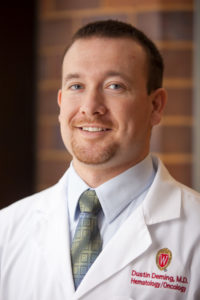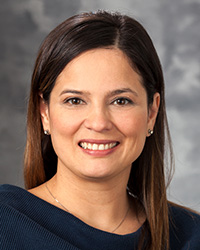July 1, 2019:
Investigator Spotlight:
Imagine having surgery to remove a tumor, and by the time you’ve recovered from the operation, your oncologist has determined a specific drug regimen that is targeted to treat your cancer.
“If you get diagnosed with a bacterial infection, we take a culture, grow the bacteria in the lab, and treat the cultures with antibiotics,” said Dustin Deming, MD, a gastrointestinal oncologist and researcher with the UW Carbone Cancer Center. “This helps us learn what antibiotic will best treat an infection. Why can’t we do the same thing for cancer?”
Shifting “trial and error” treatment approaches from patients to cell cultures could spare patients time and unnecessary side effects while providing a personalized form of treatment.
The challenge to this approach has traditionally been the difficulty of growing cancer cells in the lab, but research in Deming’s lab, which focuses on gastrointestinal cancers, is overcoming this limitation.
“If you take cancer cells and put them on a plastic dish, only 10% of those cells will grow, but we’ve developed a technique where we lock cancer cells in a gel-like substance where we can provide them with all the different nutrients and growth factors they need to grow,” Deming said. “By doing this, we can grow cells from 70-90% of cancers.”
Now that they can grow and maintain cancer cells at high success rates, Deming and his research team are studying if drugs that are effective at killing patients’ cancer cells in the lab will work to treat individual patients in the clinic.
This research, funded in part by Garding Against Cancer, is an offshoot of the Precision Medicine Molecular Tumor Board (PMMTB), which was launched in 2015 by Deming and Mark Burkhard, MD, PhD, an oncologist and researcher at UW Carbone. The PMMTB is supported by the UW Collaborative Genomics Core, the UW Carbone Cancer Center, and nearly $500,000 in annual state funding.
“Game Changing” Recent Advances in Lung Cancer Treatment
 When medical oncologist Ticiana Leal, MD, spoke at the UW Carbone Cancer Center’s Lung Cancer Awareness Night in late 2018, she brought her cautious optimism to the patients and families in attendance.
When medical oncologist Ticiana Leal, MD, spoke at the UW Carbone Cancer Center’s Lung Cancer Awareness Night in late 2018, she brought her cautious optimism to the patients and families in attendance.
“In the past year alone, there have been many advances in lung cancer treatment, and several presentations of impact in clinical research that have already changed the standard of care,” Leal says. “These advances in immunotherapy have only been coming since 2015 when we had the approval of the first immunotherapy in lung cancer; before then most patients received chemotherapy.”
For a disease that had a five-year survival rate of only five percent for advanced stages, the addition of immunotherapy has improved that rate to 16 percent, and Leal expects it to keep increasing.
UW Carbone has participated in and is leading lung cancer immunotherapy clinical trials, and it has been enlightening to see patients derive benefit from their participation. For example, for patients with advanced non-small cell lung cancer (NSCLC, of which 85 percent of all lung cancers are) whose tumors test high for levels of an immune-blocking protein, PD-L1, immunotherapy was shown to be superior compared to chemotherapy.
“And then there are the 15 percent of patients with small cell lung cancer. We saw no advances in treatments for this population in nearly 30 years,” Leal says. “In a recent trial that we participated in, patients who received immunotherapy plus chemotherapy, compared to chemotherapy alone, lived longer and had improved tumor control and good tolerability. That treatment strategy is likely to be approved by the FDA soon. We also look forward to seeing other immunotherapy combinations move forward.”
Another area of research making huge strides is in targeted therapies, and Leal calls lung cancer the “poster child” for these directed treatments in the era of precision medicine.
“Our prior way of practicing was that all lung cancers are the same, and they all get treated the same way,” Leal says. “One of the breakthroughs was understanding there are alterations within tumor cells that may be driving the cancer, and more importantly that we can identify that pathway and block it with a drug.”
For example, mutations in the EGFR gene or rearrangement in the ALK genes are present in approximately twenty percent and five percent, respectively, of patients with a subtype of NSLCL. New EGFR and ALK-targeted therapies are now approved for use in the clinic, and patients are living months to years longer, with fewer side effects and better quality of life. As new genetic alterations are identified in small subsets of the NSCLC population, Leal stresses the importance of genomic testing in lung cancer therapy.
“Some of these alterations are quite rare. We know around one percent of patients have a ROS-1 fusion and there is an approved therapy,” Leal says. “If you don’t test for it routinely in patients with lung cancer, you’re unlikely to identify and understand the impact that this can make in an individual’s life. But then you find one patient who derives benefit and you’re like, ‘That’s a game changer.’”
Leal is careful to stress the need for continued and improved research, as she and other lung medical oncologists at UW Carbone are not currently able to provide these breakthrough treatment options for all patients they see.
“Looking for really refined biomarkers is a very important topic in lung cancer,” Leal says. “Additionally, another area of active investigation is in patients with earlier stage lung cancer who undergo surgery in order to improve cure rates. There are still improvements to be made in the field.”
But, she adds, “the significant impact research is having in the lives of patients … it’s been amazing to see that in my career.”
About the Big Ten Cancer Research Consortium: The Big Ten Cancer Research Consortium was created in 2013 to transform the conduct of cancer research through collaborative, hypothesis-driven, highly translational oncology trials that leverage the scientific and clinical expertise of Big Ten universities. The goal of the Big Ten Cancer Research Consortium is to create a unique team-research culture to drive science rapidly from ideas to new approaches to cancer treatment. Within this innovative environment, today’s research leaders collaborate with and mentor the research leaders of tomorrow with the unified goal of improving the lives of all patients with cancer.
About the Big Ten Conference: The Big Ten Conference is an association of world-class universities whose member institutions share a common mission of research, graduate, professional and undergraduate teaching and public service. Founded in 1896, the Big Ten has sustained a comprehensive set of shared practices and policies that enforce the priority of academics in the lives of students competing in intercollegiate athletics and emphasize the values of integrity, fairness and competitiveness. The broad-based programs of the 14 Big Ten institutions will provide over $200 million in direct financial support to almost 9,500 students for more than 11,000 participation opportunities on 350 teams in 42 different sports. The Big Ten sponsors 28 official conference sports, 14 for men and 14 for women, including the addition of men’s ice hockey and men’s and women’s lacrosse since 2013. For more information, visit www.bigten.org.
















Subscribe to the Big Ten CRC Newsletter X
X Facebook
Facebook YouTube
YouTube